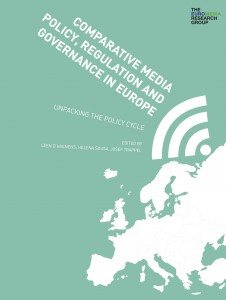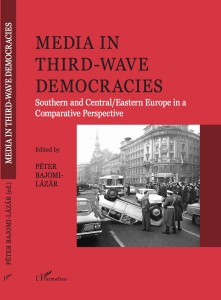is a network of European researchers that began life in 1982 as a workshop on media policy, convened by Dr Karen Siune of Arhus University, within the framework of the European Consortium for Political Research (ECPR). Since then it has continued on its own initiative, changing in membership over time, but with the same working methods and purposes. It aims to collect and exchange information and to develop and apply frameworks that help to describe and analyse developments in media structure and policy in the European region. The core activity of the group has been to meet regularly in each others’ countries and to produce a sequence of books.
New Publications
Trappel, Josef (ed.) (2019)
Digital Media Inequalities
Policies against divides, distrust and discrimination
Utgivare: Nordicom
Digital technologies are currently changing the way we talk to one another and the way organisations and politics communicates with citizens. But digital does not necessarily mean better understanding. In a new Nordicom anthology, researchers from across Europe explores new inequalities created by the digital transformation.
Here’s a link to the Nordicom website where it’s available to download as open access: https://nordicom.gu.se/sv/publikationer/digital-media-inequalities

D’Haenens, Leen/ Sousa, Helena/ Trappel, Josef (eds) (2018) Comparative Media Policy, Regulation and Governance in Europe Unpacking the Policy Cycle.
Bristol, Intellect.
European media experience a period of disruptive transformation. This textbook maps contemporary media policy and industry activities and assesses critically the implications or new digital technologies on the production, distribution and consumption of the media. Chapters address relevant topics of the current media policy debate, including policies of the European Union and the Council of Europe, governance and internet policy issues, media subsidies and the role of the media in contemporary democracies.
Table of content (75 KB)
Cover Text (66 KB)
Intellect product website
Thanks to the open-access policy of the University of Salzburg, two chapters of the book an be downloaded for free:
Chapter 5: Fuel for the Media
Chapter 10: Media and Democracy: A Couple Walking Hand in Hand?

Péter Bjomi-Lázar (ed) (2017) Media in Third-Wave Democracies. Southern and Central/Eastern Europe in a Comparative Perspective.
Paris, Budapest: L’Harmattan.
This volume offers comparative studies on media regulation, internet use, journalism cultures, as well as seven country case studies from the two regions, including on Greece, Portugal, Spain, Hungary, Poland, Slovakia and Slovenia. Most papers were presented at a conference organized by the Budapest Business School and the Euromedia Research Group in April 2016 in Budapest.

Trappel, Josef / Steemers, Jeanette / Thomass, Barbara (eds.) (2015) European Media in Crisis: Values, Risks and Policies. London, New York: Routledge.
When the financial markets collapsed in 2008, the media industry was affected by a major slump in advertising revenues, and a formerly highly successful business model fell into a state of decay. This economic crisis has threatened core social values of contemporary democracies, such as freedom, diversity and equality. Taking a normative and policy perspective, this book discusses threats and opportunities for the media industry in Europe: What are the implications of the crisis for professional journalism, the media industry, and the process of political communication? Can non- state and non-market actors profit from the crisis? And what are media policy answers at the national and European level?
Table of content (442 KB)
Preface (424 KB)
Routlege Product Website
 Sousa, Helena / Trützschler, Wolfgang / Fidalgo, Joaquim / Lameiras, Mariana (eds.) (2013) Media Regulators in Europe: A Cross-Country Comparative Analysis. Braga: CECS – Communication and Society Research Centre
Sousa, Helena / Trützschler, Wolfgang / Fidalgo, Joaquim / Lameiras, Mariana (eds.) (2013) Media Regulators in Europe: A Cross-Country Comparative Analysis. Braga: CECS – Communication and Society Research CentreStates around the world are gradually setting up or reconfigurating existing media regulators. The nature and performance of theses bodies vary profoundly from country to country. This book written by members of the Euromedia Research Group and together with other authors aims at gathering and analyzing information about media regulators in Western Europe. Media regulators are supposed to improve the overall quality of the media and they are expected to raise media standards. But do they? And, if so, how and why?

